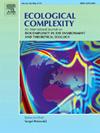从表面上看盖亚假说
IF 3.1
3区 环境科学与生态学
Q2 ECOLOGY
引用次数: 2
摘要
对理解气候-生命系统的兴趣催生了盖亚假说(GH),导致了多种解释理论,使其地位不明确和有争议。这项工作旨在为围绕GH的争论带来一些清晰度,目的是使其能够接受科学审查。我们讨论了从表面上看待全球气候变化意味着什么,以及它对一个我们称之为“功能气候学”的潜在研究项目的影响。本文章由计算机程序翻译,如有差异,请以英文原文为准。
Taking the Gaia hypothesis at face value
The interest in understanding the climate-life system that has fostered the Gaia hypothesis (GH) has resulted in multiple explanatory theories, making its status unclear and controversial. This work seeks to bring some clarity to the debates surrounding the GH with the aim to make it amenable to scientific scrutiny. We discuss what it means to take the GH at face value and its implications for a potential research programme we call ‘functional climatology’.
求助全文
通过发布文献求助,成功后即可免费获取论文全文。
去求助
来源期刊

Ecological Complexity
环境科学-生态学
CiteScore
7.10
自引率
0.00%
发文量
24
审稿时长
3 months
期刊介绍:
Ecological Complexity is an international journal devoted to the publication of high quality, peer-reviewed articles on all aspects of biocomplexity in the environment, theoretical ecology, and special issues on topics of current interest. The scope of the journal is wide and interdisciplinary with an integrated and quantitative approach. The journal particularly encourages submission of papers that integrate natural and social processes at appropriately broad spatio-temporal scales.
Ecological Complexity will publish research into the following areas:
• All aspects of biocomplexity in the environment and theoretical ecology
• Ecosystems and biospheres as complex adaptive systems
• Self-organization of spatially extended ecosystems
• Emergent properties and structures of complex ecosystems
• Ecological pattern formation in space and time
• The role of biophysical constraints and evolutionary attractors on species assemblages
• Ecological scaling (scale invariance, scale covariance and across scale dynamics), allometry, and hierarchy theory
• Ecological topology and networks
• Studies towards an ecology of complex systems
• Complex systems approaches for the study of dynamic human-environment interactions
• Using knowledge of nonlinear phenomena to better guide policy development for adaptation strategies and mitigation to environmental change
• New tools and methods for studying ecological complexity
 求助内容:
求助内容: 应助结果提醒方式:
应助结果提醒方式:


